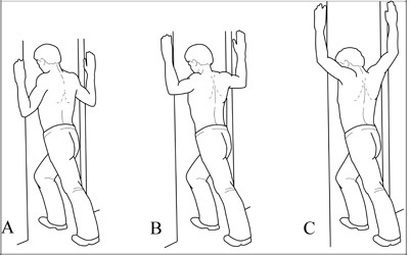The neck portion of your spine, the cervical spine, has seven vertebrae. Passing inside of vertebrae is the spinal cord. Originating from the spinal cord, there are eight nerves. These nerves exit the spine between each of the vertebrae and combine together into a large bundle of nerves. The bundle of nerves then pass under the chest muscles, through the shoulder and down the arm. The primary function for most of these nerves is to control pain or touch sensations and the contraction of the muscles of the arm.
When someone sleeps with their arm under their pillow or over their head, the bundle of nerves can become mildly stretched. When this happens, the nerves cannot perform their job as well. For example, if a water droplet hits your hand, a message from the hand is sent through the nerves to the spinal cord and then to the brain. Your brain then consciously tells you that your hand is being touched. So, if the nerves become stretched, they cannot communicate their message to the spine properly. This will eventually make your hand and arm feel numb and weak. This can also happen to those of you that prefer to sleep curled up into the fetal position. Your arms are likely curled up tight in front of your chest. This position causes compression of the nerves as they pass through the shoulder and into the arm area. The resulting numbness in the arm and hand will occur again for the same reason. Also, if you spend too much time at the computer or drive for long distances, the muscles in the chest and shoulder can become very tight. This can also compress the nerves as they pass through the shoulder and give the same result of numbness. If these muscles are only mildly tight but not enough to cause numbness, the overall space that the nerves have to pass through is still less. If you combine this scenario with your arm in the previously mentioned sleeping positions, you are even more vulnerable to experience the numbness.
So how stop the numbness? First of all, avoid sleeping with your arms over your head or curled up in front of you. To alleviate the potentially tight muscles in the chest and shoulder, a simple stretch has been shown. Avoid a slouching posture, as the shoulders will roll forward and further decrease the available space for the nerves to pass through the shoulder and into the arm. If you are experiencing numbness into the arm or hand, you should also have your neck properly examined by a Chiropractor because all of these nerves pass through this area. Problems in the neck can cause symptoms very similar to Thoracic Outlet Syndrome.
Next week I will discuss proper sleeping positions. If you have any questions about neck pain or a topic for my next blog, email me at [email protected] or visit my website, http://www.landrumdc.com


 RSS Feed
RSS Feed
